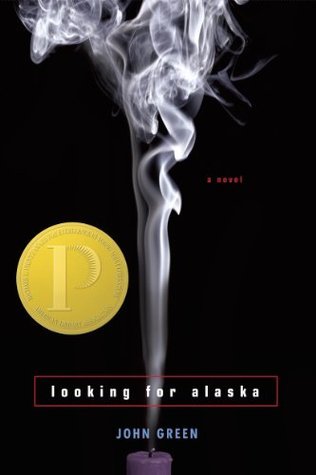Synopsis
"Before. Miles "Pudge" Halter's whole existence has been one big nonevent, and his obsession with famous last words has only made him crave the "Great Perhaps" (François Rabelais, poet) even more. He heads off to the sometimes crazy, possibly unstable, and anything-but-boring world of Culver Creek Boarding School, and his life becomes the opposite of safe. Because down the hall is Alaska Young. The gorgeous, clever, funny, sexy, self-destructive, screwed-up, and utterly fascinating Alaska Young, who is an event unto herself. She pulls Pudge into her world, launches him into the Great Perhaps, and steals his heart.
After. Nothing is ever the same."
Review
Looking for Alaska is the third book I've read by John Green, after The Fault in Our Stars and Will Grayson Will Grayson (review available here).
Once again, it
confirms the author's talent for young adult and for writing interesting,
quirky characters, who are almost who we would like to have been as teens.
However, this isn't a light book, or a book for children. The subject is
seemingly light, but it goes way beyond the surface. The action takes place in
a boarding school, to which Miles Halter, our clumsy main character, is
transferred in the beginning of a new school year. But it is not only about
trying to fit in in a new environment, or about the typical adolescent
rebellious spirit. It also deals with darker subjects (which I won't specify
for the sake of not making spoilers) you wouldn't usually expect in a YA book.
This is a fast read, but if you also expect a light one, the only way of
achieving it is by not bonding with the characters at all. And from my limited
experience reading John Green's books, this very rarely happens.
Throughout the book,
the main character, Miles "Pudge" Halter, quickly finds himself
surrounded by a group of unforgettable characters, from his tiny, savvy and
heavy smoker roommate Chip "Colonel" Martin, to the bookish,
mysterious and rebellious Alaska. The reader accompanies the group through a
series of adventures, pranks and insightful, almost phylosophical
conversations.
Overall, this is a
book for people who enjoy YA and who appreciate John Green's very particular
style of writing. I would recommend searching for as little information about
the book as possible before beginning to turn the pages, and waiting for what
the next one brings. Every plot twist is worth it and, in its whole, this book
was a pleasant surprise.
Sinopse
"Antes. Toda a existência de Miles "Pudge" Halter tem sido um grande não-evento, e a sua obsessão com últimas palavras famosas apenas o fez ansiar o "Grande Talvez" (François Rabelais, poeta) ainda mais. Parte para o por vezes louco, possivelmente instável, mas tudo menos aborrecido mundo do Colégio Interno de Culver Creek, e a sua vida torna-se o oposto de segura. Porque ao fundo do corredor está Alaska Young. A linda, inteligente, engraçada, sexy, auto-destrutiva, perturbada e absolutamente fascinante Alaska Young, ela própria um evento. Traz Pudge para o seu mundo, lança-o para o Grande Talvez e rouba o seu coração.
Depois. Nada será o mesmo."
Opinião
Looking for Alaska é o terceiro livro de John Green que leio, depois de A Culpa é das Estrelas e Will Grayson Will Grayson (cuja opinião está disponível aqui).
Li Looking for Alaska sabendo tão pouco sobre o livro quanto possível. Está dividido em duas secções, o antes e o depois de um evento decisivo. E se existem livros nos quais esta abordagem se acaba por revelar despontante, este não é um deles.
Ao longo do livro, a personagem principal, Miles "Pudge" Halter, rapidamente se vê rodeado por um grupo de personagens inesquecíveis, desde o seu pequeno companheiro de quarto Chip "Colonel" Martin, esperto e um fumador pesado, até à rebelde e misteriosa Alaska, uma ávida leitora. O leitor acompanha o grupo por uma série de aventuras, partidas e conversas perspicazes, quase filosóficas.
No geral, este é um livro para quem aprecia Young Adult, e para fãs do estilo de escrita bastante próprio de John Green. Recomendo procurar tão pouca informação quanto possível antes de começar a virar as páginas, e esperar pelo que traz a próxima. Cada plot twist vale a pena e, no seu todo, esta obra foi uma agradável surpresa.









